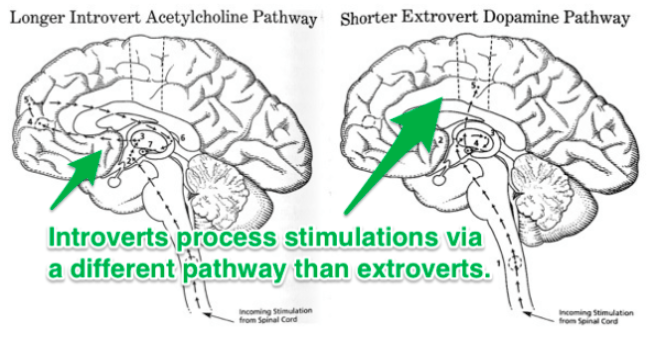In my previous post, I explored the difference between being an introvert, or extrovert. And, if you’ve realized you are an “inny”, rather than an “outty”, I’m going to try to help you realize even more about yourself and how to be a successful introvert in business. If you are wondering–yes, I am an introvert–and as an introvert, I have come up against a lot of obstacles. Whether it is feeling an intense need to get away, or be by myself, or dealing with the guilt of needing to be alone, I’m going to go a bit deeper in the scientific, neurological, and emotional matters in this post. More than anything, I want you to understand why you do what you do, and how your decisions are made.
We Make Decisions Based on Stimulation
Whether we realize it or not, every decision we make is based on our reaction to other people’s personalities. Does something get our attention, or drive us away? Do we feel comfortable around someone, or are we clenching our teeth and waiting for a polite moment to run? How do we act in our relationships? Do we confront, or avoid conflict? Do we have the ability to self-promote? Or does the idea of sales or public speaking send us into an overwhelm of anxiety?
Susan Cain brings up the concept that it is simply a matter of stimulation. Some of us are more sensitive to the energy of people (or crowds) than others. And, if we want to perform well, there is a simple solution.
“The key then to maximizing our talents is for us to put ourselves in the zone of stimulation that is right for us.” Susan Cain, The Power of Introverts (Ted Talk)
Introverts are Neurologically Different than Extroverts
Stimulation, as it turns out, is actually processed differently in the receptors we have in our brains. The ARAS or ascending reticular activating system, is a part of our brain stem that interacts with our cerebral cortex, and basically measures our sense of arousal. Introverts and extroverts measure these inputs very differently, which is why two people in the same situation can have completely different responses.
“Introverts have wide-open information channels, causing them to be flooded with stimulation and over-aroused, while extroverts have tighter channels, making them prone to under-arousal. Over-arousal doesn’t produce anxiety so much as the sense that you can’t think straight—that you’ve had enough and would like to go home now. Under-arousal is something like cabin fever. Not enough is happening: you feel itchy, restless, and sluggish, like you need to get out of the house already.” – Susan Cain
This is the reason why introverts can only “handle” so much interaction before getting the intense need to leave, or be alone. It isn’t that they no longer enjoy the social event or function, it is simply that their brains have reached a point of over-stimulation, and in order to get it back to normal, they must leave the situation to resume regular brain function. I have experienced this anywhere from a mild form of anxiety, to a full blown panic attack. Once I removed myself from the overstimulating situation, everything returned to normal. But, here is something else to consider:
The World is Designed for Extroverts
“Our most important institutions are designed for extroverts.” -Susan Cain
With the induction of radio, television, and Hollywood movie stars came the Personality Revolution. Or, what I would call, “The Big I AM”. As Cain points out, our values shifted as a society from one of moral character, to one of creating giant personalities that would get noticed. Somehow, the big plastic smile and hard handshake started to win the room, and the vote. To be confident suddenly overruled competence, and now, the loudest person in the room became the “smartest”.
As an introvert, I am affected daily by feeling as though I’m in a pushy world of extroverts. Since our society prides itself on mottos such as “the bigger, the better”, “the squeaky wheel gets the oil”, and the “sell yourself or sell yourself short”; it is easy to feel overwhelmed, overlooked, and if you choose not to participate in this competition for attention, you may end up feeling undervalued.
Emotionally speaking, you may have difficulties in the following areas:
-
Asking for what you want
-
Avoiding Conflict
-
Selling yourself short
-
Feeling Guilty for wanting to be by yourself
Finding Your Balance
The most important thing to consider, as an introvert, is how you can set up your life so that you can maintain a healthy balance. Whether you realize it or not, you have a threshold for social interaction. Start paying more attention to what that means for you, and learn how to better manage it. For example, I am not overwhelmed by small groups (four or less) in quiet settings where we can have discussions and meaningful conversations. Any more than that amount, and I know my threshold will only be a couple of hours.
For my work, I have carefully designed my life so that I interact with my clients one-on-one. This allows me to give focused and thoughtful attention to their lives, and business needs, and I do not go into overexertion. In relationships (and friendships), I am very open about the fact that I am an introvert, and need space, quiet time, and give myself permission to bow out early from events. Most of my friends know me well enough to not take it personally, and understand that I will spend more time with them in a smaller group, soon enough.
How To Be a Successful Introvert in Business
There are ways to be successful, once you know what your up against. By accepting your “weaknesses”, and focusing on your strengths, you can turn this knowledge around for your advantage. As introverts, we tend to have issues with these topics: Confrontation, Marketing, Confidence (speaking up for ourselves), and Boundaries.
Problems and Solutions
- CONFRONTATION: You should know that in business, any type of confrontation will be difficult for you. SOLUTION: Cover yourself by using real contracts, having pricing plans, working from home, or even working online only. The more distance you can create to keep some barriers between you and the outside world, the more comfortable (and Confident) you will become.
- MARKETING: You will find it difficult “putting yourself out there”. SOLUTION: Get some outside help when it comes to skills that you find difficult. This way you can save yourself some time and over-analysis on things like PR, Marketing, or getting over your general feel of putting yourself “out there”. My FREE Video Course covers how I was able to take a in person business and put it online. Check it out so you can start today.
- CONFIDENCE: While you have a quiet strength, it is often difficult to stand up to overwhelming personalities. SOLUTION: Accept that your knowledge is sound, because as an introvert we are prone to analyzing, researching, and finding answers more than our loud friends, the extrovert. Don’t be afraid to speak up and stand your ground when someone challenges you – you are likely to be right.
- BOUNDARIES: Setting up rules in your life to be less available may be a challenge, but it is so worth it. SOLUTION: I spend loads of “quiet time” alone. This time allows me to think clearly, find better solutions, and be a more productive and successful introvert in business. I consider this work time, even if I am not sitting doing work, because it allows me the power to focus once the work begins. Guard your time with your life, as it is one in the same.
If you look at the examples I have shared, it becomes evident that I have structured My Entire Life so that I can have a sense of balance with my Introverted Ways. I encourage you to take a deeper look at your life, what your comfort zones are, and begin to communicate with those you care about so that they understand how you operate best, feel most comfortable, and can be most productive.
I’ve put together some resources that you might find helpful, and definitely check out the video below…
Resources for Your Inner Introvert
Why Introverts Can Make The Best Leaders
Quiet: The Power of Introverts – By Susan Cain
Remember, some of our greatest minds have been introverts, so give yourself the quiet that you need to tap into your Inner Brilliance!!


